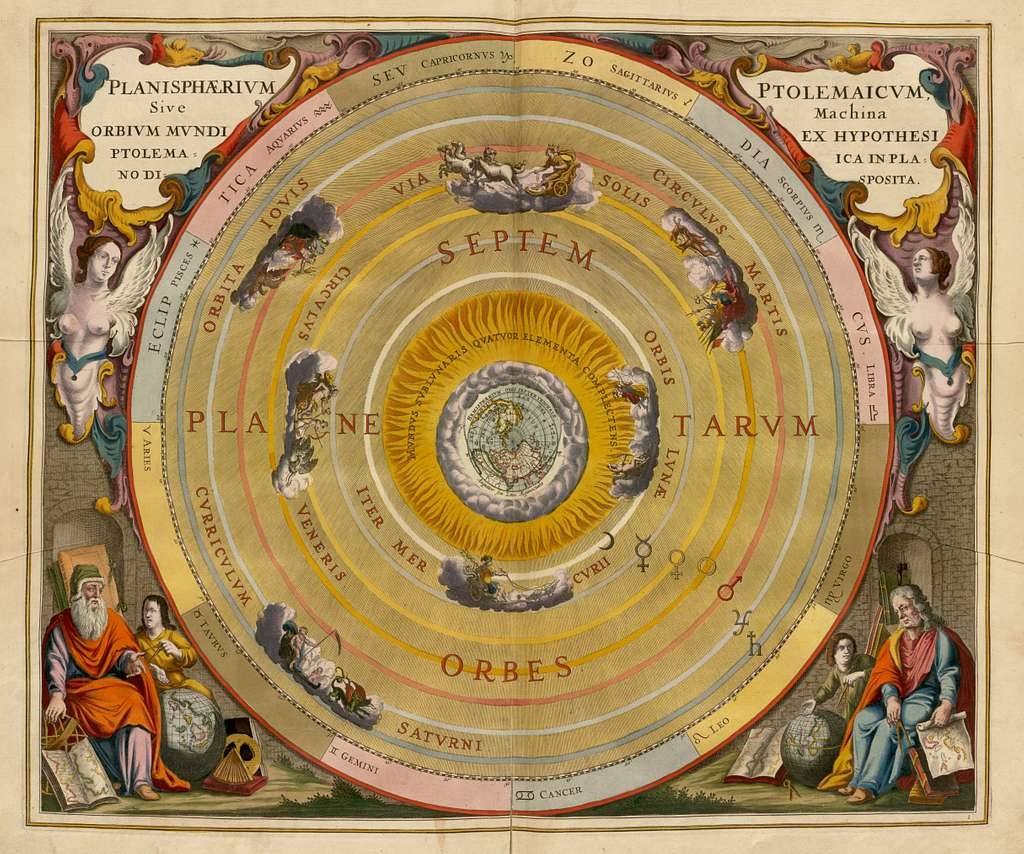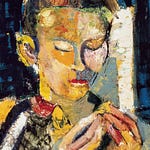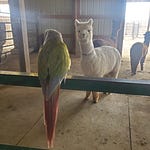
I recently learned that the Latin word machina—that distinctly useful and germane familiar of terms like machine, machination, magic, etc.—was a name for the Roman platform on which enslaved persons were sold.
This nominal connection was made by the poet David Mutschlecner in an unpublished essay. When I read it, the formative force of the lineage—the confluence of signs—made me gasp, as if the syntax was a literal fist flung at my gut, or a sacral seed of horror had suddenly sprouted in my chest. It was a revelation. It was painful, like sudden light in a dark, dark room.
*
I’ve been wondering about etymological confluence, metaphorically following wonder’s meander as it channels into questions: Just what—in the above “revelation”—was revealed? How do “making” and “revealing” differ? Is God a hider or a hidden thing? (Who dictates the hiddenness of history?) If mechanics and mystery are dancing partners, what sort of song are they listening to? Yadda la-di-da…
That “the machine” is linguistically coequal with systems of mastery and enslavement comes as no surprise, partly because we’re numb to violence—especially as it is coded in language—and partly because the given coequality is one of many coequal meanings, birthed over time: machina is, of course, more than a platform.
When words are treated as base platforms in the greater exchange of meaning, communication is demoralized (depersonalized, dehumanized). This may be as close to the revelation’s object as I can get. It begs the question: Do we even want communication to be humane? Or do we just want to communicate the same sort of power imbalances that we lament in the world around us?
Like David, I tend to see poetry as the primary and primal cure: an approach to the world—in the world—as potential as it is extant, as metaphysical as it is mundane.
But today’s poets may be too busy making to be made.
*
Early in our recorded conversation, Jeff spoke to what he sees as the principal “stigma” of contemporary life (particularly in the west): the sense in which self-worth is compromised by accepted mores of production. In other words, the conflation of oneself and one’s work—i.e. industry-as-identity—abides a system of valuation that ultimately obscures our deeper purpose(s), or inhibits the greater offering, if I may, of our Existence.
It would be nice to ground this line of thought in Marxist philosophy and political theory, where it probably belongs, but I haven’t done the readings. I have, instead, worked in hospitality and read poetry. And my mind goes back to this:
I once took a workshop with the amazing mentor and collaborative poet Maureen Seaton. We were studying the art of memoir, which means we were also studying “anti-memoir,” or the ways in which memoir, as praxis and genre, fails to communicate the full extent of the person; we were studying the limits of memory.
I remember lots about this workshop—admiring the older students, defending Billy Collins, being destroyed by Fernando Pessoa, etc.—but perhaps the most crystalline “takeaway” was something Maureen said, as a balm against despair and creative blockage:
“Follow your obsessions.”
I’ve spent more than fifteen years of thinking about this (among other things, naturally), and here is what I take it to mean: The task, as regards one’s obsessions, is to follow, not become them. To follow is to call deep, dynamic instincts to the fore, and to abide their signals: the follower’s gaze is equally inward and outward. Following is a sublimation of hunting, because the objective is… less certain. Why follow? To consume? To mimic? To learn?
Follow your obsessions. But keep your distance. Take time off. Because obsessions are like diamonds in the digital strip mines of the attention economy: where other gems attract attention, obsessions guarantee it.
*
Conversation with Jeff Chelf has the quality of something coming together of its own accord, like coral. He is utterly responsive. He is casual but not frivolous, conceptual but not overconfident, self-aware but not self-conscious. He’s a wonderful blend of gravity and levity, which fittingly belies his remarkable background in fabrication. He is an artist in the most embodied and platform-resistant sense.
We met to talk in what is now Perelandra’s reading/poetry room but was, at the time, a storage closet. There we hid from cars and careers, divisions and declamations. And in hiding we spoke, and in speaking we shared, and it turned out we weren’t hiding, at all—
Books of the month (Nov. 2022)
Independent People (1934) by Halldór Laxness
Little Ice Age (2001) by Maureen Seaton
The Economization of Life (2017) by Michelle Murphy
Ways of Being: Animals, Plants, Machines: The Search for a Planetary Intelligence (2022) by James Bridle















The pricelessness of personhood | Jeff Chelf